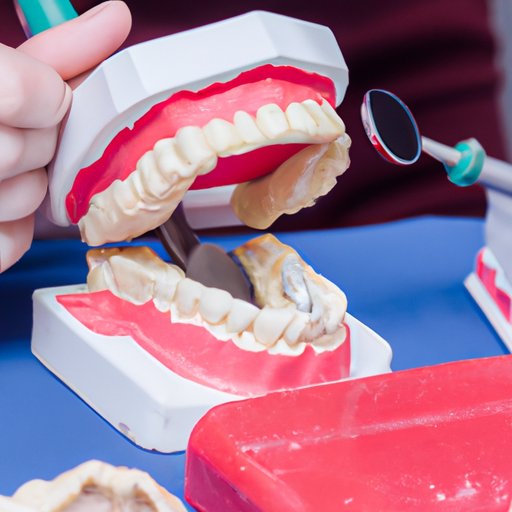Introduction
Becoming a dental hygienist is a rewarding and satisfying career choice, but it often requires several years of schooling and training. The question of how many years of school does it take to become a dental hygienist is one that many prospective students have. This article will explore the education and training requirements for becoming a dental hygienist, as well as the different types of degree programs available and the amount of time needed to complete them.

Exploring the Education Requirements to Become a Dental Hygienist
The first step toward becoming a dental hygienist is to complete the appropriate educational requirements. Most states require dental hygienists to have at least an associate’s degree from an accredited dental hygiene program, although some states may require a bachelor’s degree. In addition to coursework, students must also pass a state licensing exam.
Dental hygiene degree programs can be completed in two to four years and typically include courses in anatomy, physiology, chemistry, nutrition, and other related topics. Students will also typically gain hands-on experience in a clinical setting, which is necessary in order to become a licensed dental hygienist. Other qualifications may include CPR certification and completion of a background check or drug test.
How Many Years of School Does it Take to Become a Dental Hygienist?
The amount of time needed to become a dental hygienist varies depending on the type of degree program you choose. An associate’s degree typically takes two years to complete, while a bachelor’s degree requires four years. For those who are already working in the field, there are also accelerated degree programs that allow students to complete their degrees in as little as 12 months.
In addition to the amount of time needed to complete a degree program, students must also take into account the amount of time needed to gain the necessary clinical experience and other qualifications. Depending on the program, this can add another year or more to the total timeline.

A Closer Look at the Training and Education Needed to Become a Dental Hygienist
In addition to completing the required coursework and passing the licensing exam, students must also gain hands-on experience in a clinical setting. This is typically done through internships or externships, which allow students to gain valuable experience and insight into the field of dental hygiene. These experiences can also help students prepare for the licensing exam.
In addition to gaining clinical experience, students must also acquire other skills and qualifications in order to become a successful dental hygienist. These can include communication skills, problem-solving skills, and knowledge of computer software and technology. It is also important for prospective dental hygienists to have a strong understanding of the principles of patient care, as well as a commitment to providing quality service.

Understanding the Path to Becoming a Dental Hygienist in Just a Few Years
For those who are looking to become a dental hygienist in a shorter amount of time, there are accelerated degree programs available. These programs are designed to be completed in 12 months or less, allowing students to quickly and efficiently gain the necessary skills and qualifications to become a dental hygienist. Accelerated programs typically require more intensive coursework and involve more hands-on experience than traditional degree programs.
In addition to being able to complete the program in a shorter amount of time, accelerated degree programs also offer other benefits. These can include lower tuition costs, smaller class sizes, and more individualized attention from instructors. It is important to note, however, that accelerated programs can be more difficult and require more dedication and hard work.
Taking the Steps Toward a Career as a Dental Hygienist: What You Need to Know
If you are considering a career as a dental hygienist, there are a few steps you should take. First, research the different types of degree programs available and determine which one is right for you. Then, look for a program that has the right mix of coursework, clinical experience, and other qualifications that meet your needs. Finally, make sure to do your due diligence when researching schools and programs to make sure you find the right fit for you.
Becoming a dental hygienist can be a challenging but rewarding journey, and it is important to do your research and carefully consider all of your options before making a decision. With the right education and training, you can start your career as a dental hygienist in just a few short years.
Conclusion
Becoming a dental hygienist requires several years of school and training, but with the right education and preparation, you can become a dental hygienist in just a few years. There are different types of degree programs available, including associate’s and bachelor’s degrees, as well as accelerated programs that can be completed in 12 months or less. It is important to do your research and carefully consider all of your options before deciding on a program.
(Note: Is this article not meeting your expectations? Do you have knowledge or insights to share? Unlock new opportunities and expand your reach by joining our authors team. Click Registration to join us and share your expertise with our readers.)
